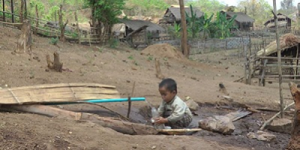 Recently, the Karenni Civil Society Network (KCSN) published an important report providing a number of updates on the current issues within Karenni State.
Recently, the Karenni Civil Society Network (KCSN) published an important report providing a number of updates on the current issues within Karenni State.
The report titled “Where is genuine peace” focused on the issues of military expansion, natural resource extraction and land confiscation within Karenni State. These were in addition to the main focus of the report, the model village project in Shadaw Township, Karenni State.
This ‘model village’ project has the aim of providing support for 10 villages in Shadaw Township near the Salween River. A spokesperson, Juha Peltonen, for Finland’s Development Minister Sirpa Paatero stated ““[T]he project has not encouraged IDPs to return. The project was initiated in support of the needs of IDPs who had already spontaneously returned.” KCSN asserts this project is being used to encourage refugees and IDPs to return prematurely.
Organisations including K.N.P.P have criticized the project. One K.N.P.P leader has been quoted as saying ‘“I would like to tell INGOs that helping the villagers is good. But they should do first what is suitable and badly needed, such as ensuring protection of human rights and farmers’ rights, and then give aid. Now it is back to front.” It is important INGOs ensure the protection of human rights before giving development aid.
The report also references a 3,000 acre land confiscation in Pruso Township and military checkpoints along the roads as examples of a continued military presence in Karenni State. Military soldiers continue to force drivers to carry them and their luggage. This is an obvious violation of villager’s basic rights.
The model village project is run by the Myanmar Peace Support Initiative (MPSI). It is supported by aid from Finland’s ministry of foreign affairs. The on the ground practical initiative is done by the Loikaw-based, Kainayah Rural Social Development Organisation.
Experienced organisations such as the Karenni Social Welfare and Development Center, KSWDC, were not involved in the project. This was because the MPSI would only partner with organisations that are registered inside Burma.
If you would like to find out more and read this report in full, it can be found here.
